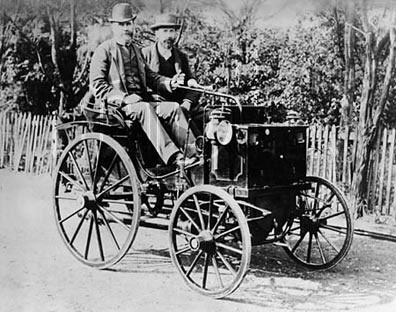In 1895, a committee of journalists and automotive pioneers, including Emile Levassor and Armand Peugeot, France’s leading manufacturer of bicycles, spearheaded the Paris-Bordeaux-Paris race in order to capitalize on public enthusiasm for the automobile. Out of 46 entries, Emile Levassor finished first in the world's first real automobile race, but was later disqualified on a technicality; first place went to a Peugeot that finished 11 hours behind him.
Levassor drove a Panhard et Levassor car with a two-cylinder, 750-rpm, four-horsepower Daimler Phoenix engine, completing the 732-mile course, from Paris to Bordeaux and back, in just under 49 hours, at a then-impressive speed of about 15 miles per hour.
Levassor drove a Panhard et Levassor car with a two-cylinder, 750-rpm, four-horsepower Daimler Phoenix engine, completing the 732-mile course, from Paris to Bordeaux and back, in just under 49 hours, at a then-impressive speed of about 15 miles per hour.
Panhard et Levassor
The Paris-Bordeaux-Paris race highlighted France’s superiority in automotive technology at the time, and established Panhard et Levassor as a major force in the fledgling industry. Its success spurred the creation of the Automobile Club de France in order to foster the development of the motor vehicle and regulate future motor sports events. Over the next century, these events would grow into the Grand Prix motor racing circuit, and eventually into its current incarnation: Formula One.
The Paris-Bordeaux-Paris race highlighted France’s superiority in automotive technology at the time, and established Panhard et Levassor as a major force in the fledgling industry. Its success spurred the creation of the Automobile Club de France in order to foster the development of the motor vehicle and regulate future motor sports events. Over the next century, these events would grow into the Grand Prix motor racing circuit, and eventually into its current incarnation: Formula One.

No comments:
Post a Comment